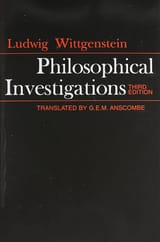Anonymous
6/29/2025, 3:59:49 PM No.24506049
>Wittgenstein realized that words don’t have meaning in isolation. They get their meaning from how they’re used in context, much like tools in a toolbox. A hammer gets its meaning from the work it does, so does a word.
The individual mind gives meaning to things. Nothing by itself has meaning. A isolated word can have meaning if you will. In Sanskrit, syllables have meaning.
The individual mind gives meaning to things. Nothing by itself has meaning. A isolated word can have meaning if you will. In Sanskrit, syllables have meaning.
Replies:

